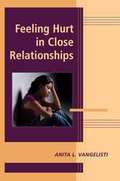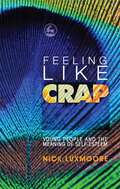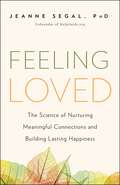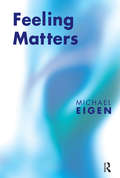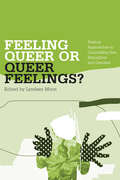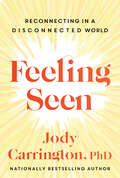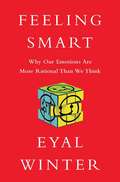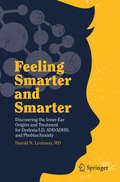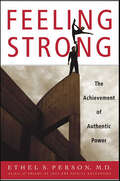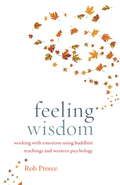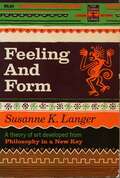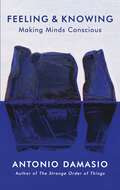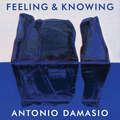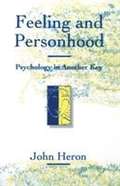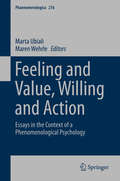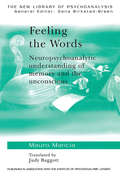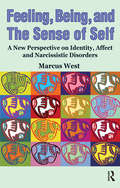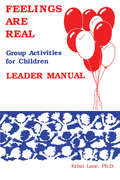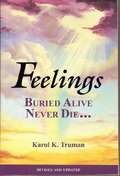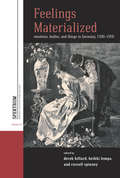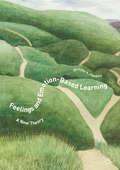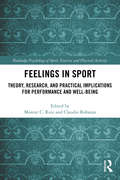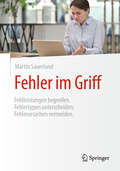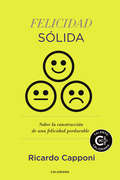- Table View
- List View
Feeling Hurt in Close Relationships
by Anita L. VangelistiFeeling Hurt in Close Relationships presents a synthesis of cutting-edge research and theory on hurt. Being hurt is an inevitable part of close relationships. What varies from relationship to relationship is not whether partners hurt each other, but how their relationship is affected by hurtful episodes. Given the potential influence of hurt feelings on people's interpersonal relationships, it is not surprising that scholars have begun to study the antecedents, processes, and outcomes associated with hurt. This collection integrates the various issues addressed by researchers, theorists, and practitioners who study the causes of hurt feelings, the interpersonal events associated with hurt, and the ways people respond to hurting and being hurt by others. To capture the breadth and depth of the literature in this area, the work of scholars from a variety of disciplines - including social psychology, communication, sociology, and family studies - is highlighted.
Feeling Like Crap: Young People and the Meaning of Self-Esteem
by Nick LuxmooreWe use the word all the time, but what exactly is self-esteem, and how do young people develop it? Feeling Like Crap explores how a young person's self is constructed, and what might really help that self to feel more valued and confident. Through accounts of his individual and group work with young people, Nick Luxmoore demonstrates how listening to, engaging with and being respectful of young people can provide the support they need to help them repair their sense of self and offer them new possibilities and directions in life. When Grace was three, her parents split up and she went to live with her father while her sister stayed with their mother. Allie has slipped behind with her school work since falling out with her best friend, and any positive feelings about himself that Conor may have dared to develop have been beaten out of him by his father. This compassionate and thought-provoking book will be an invaluable resource for counsellors, teachers, youth workers, and anyone else working to help young people with self-esteem issues.
Feeling Loved: The Science of Nurturing Meaningful Connections and Building Lasting Happiness (Feeling Loved Ser.)
by Jeanne SegalDo your connections with friends, family, or romantic partners leave you feeling empty, dissatisfied, or out of sync? What you may be missing is the close bond that's only experienced with people who make us feel secure and valued—the experience of feeling loved. Feeling Loved reframes the way we view love and connection and provides a new roadmap for getting the love we need. The book begins with a description of what we unwittingly do that hijacks our ability to feel loved and goes on to offer powerful researched-based tools to transform your relationships. A clinical psychologist of more than thirty years and cofounder of Helpguide.org, author Jeanne Segal, PhD, is a pioneer in the psychology of connection. Her engaging and practical approach guides readers in developing new ways of thinking, feeling, and acting in order to make life-altering social and emotional changes. In Feeling Loved, you will learn how to: - Grasp the difference between being loved and feeling loved - Identify the challenges that keep you from experiencing love and making others feel loved - Use proven techniques to reduce stress and regulate out-of-control emotions - Develop new ways of thinking, feeling, and acting to create emotional connections - Transform your relationships with everyone in your life, from family and friends to coworkers Segal makes new inroads into the science of relationships and explores the transformative power of nonverbal, face-to-face exchanges. Filled with inspirational, real-life stories, Feeling Loved provides a blueprint for getting the love and happiness we need.
Feeling Matters
by Michael EigenAs long as feelings are second-class citizens, people will be second class citizens. Experience is an endangered species. An important function of psychotherapy is to make time for experiencing. Psychic taste buds really exist and rarely rest. They feed us each other, gauge states of being, states of spirit. We taste each other's feelings and intentions. An important aim of this book is to build psychic taste buds, not put them down or pretend they don't exist. A positive feeling runs through this book, a love of life, an affirmation. Yet we discover many feel they do not have an impact. A sense of helplessness and impotence in face of awesome forces seems to be increasing. Health is a broad term with many dark threads. A creeping annihilating sense varies from pockets we try not to notice to soul murder that must be addressed. Yet individuals do try, in their private struggles and in the larger social sphere.
Feeling Queer or Queer Feelings?: Radical Approaches to Counselling Sex, Sexualities and Genders
by Lyndsey MoonFeeling Queer or Queer Feelings? presents highly innovative and contemporary ideas for counsellors, counselling and clinical psychologists and psychotherapists to consider in their work with non-heterosexual clients. Ground-breaking ideas are presented by new thinkers in the area for issues such as: coming out transgender desire theoretical modalities in working with HIV the role of therapy in bondage and discipline, domination and submission, and sadomasochism the use of queer theory in therapeutic research. Feeling Queer or Queer Feelings? will challenge present ideas about sex, gender and sexuality, and will prove to be invaluable for clinicians in this field.
Feeling Seen: Reconnecting in a Disconnected World
by Jody CarringtonDisconnection has become an epidemic, and it may require a revolutionary effort to get us back together—a reconnection revolution. Staying connected in this human race is the most direct route to happiness. But never have we been more disconnected. A call to simply connect isn’t enough any longer. Connection is what we’re wired for, and it can be easy: waving at your neighbour, going on that second date, buying coffee for the person behind you. The hard part comes when we are called on to reconnect, to repair or re-engage, especially after we’ve been wronged, alienated or hurt. We all desperately want to get it right, but this requires another step, which is the magic each of us so often misses: the act of seeing. As simple as it is complex, it all comes down to this truth: when we’re feeling seen, we will rise. Feeling Seen is a timely work with a timeless message. Written on a blueprint of theory, with a road map of reconnection (including three simple stops) and a way back for when we get lost, it leads to a place where all of those who share the human race will truly see—in ourselves as well as one another—our differences, our sorrows and our joys.
Feeling Smart: Why Our Emotions Are More Rational Than We Think
by Eyal WinterDistinguished authors like Daniel Kahneman, Dan Ariely, and Nassim Nicholas Taleb have written much about the flaws in the human brain when it comes time to make a decision. Our intuitions and passions frequently fail us, leading to outcomes we don't want. In this book, Eyal Winter, Professor of Economics and Director of the Center for the Study of Rationality at the Hebrew University of Jerusalem, wonders: why? If our emotions are so destructive and unreliable, why has evolution left us with them? The answer is that, even though they may not behave in a purely logical manner, our emotions frequently lead us to better, safer, more optimal outcomes. In fact, as Winter discovers, there is often logic in emotion, and emotion in logic. For instance, many mutually beneficial commitments--such as marriage, or being a member of a team--are only possible when underscored by emotion rather than deliberate thought. The difference between pleasurable music and bad noise is mathematically precise; yet it is also the result of evolution. And our inherent overconfidence--the mathematically impossible fact that most people see themselves as above average--affords us advantages in competing for things we benefit from, like food and money and romance. Other subjects illuminated in the book include the rationality of seemingly illogical feelings like trust, anger, shame, ego, and generosity. Already a bestseller in Israel, Feeling Smart brings together game theory, evolution, and behavioral science to produce a surprising and very persuasive defense of how we think, even when we don't.
Feeling Smarter and Smarter: Discovering the Inner-Ear Origins and Treatment for Dyslexia/LD, ADD/ADHD, and Phobias/Anxiety
by Harold N. Levinson, MDIn this ground-breaking book, Dr. Harold Levinson, a renowned psychiatrist and clinical researcher, provides his long-awaited follow-up work about truly understanding and successfully treating children and adults with many and diverse dyslexia-related disorders such as those found on the cover. This fascinating, life-changing title is primarily about helping children who suffer from varied combinations and severities of previously unexplained inner-ear-determined symptoms resulting in difficulties with: reading, writing, spelling, math, memory, speech, sense of direction and timegrammar, concentration/activity-level, balance and coordinationheadaches, nausea, dizziness, ringing ears, and motion-sickness frustration levels and feeling dumb, ugly, klutzy, phobic, and depressedimpulsivity, cutting class, dropping out of school, and substance abusebullying and being bullied as well as anger and social interactionslater becoming emotionally traumatized and scarred dysfunctional adults Feeling Smarter and Smarter is thus also about and for the millions of frus-trated and failing adults who are often overwhelmed by similar and even more complicated symptoms—as well as for their dedicated healers. Having laid the initial foundations for his many current insights in an earlier bestseller, Smart But Feeling Dumb, Dr. Levinson now presents a compelling range of enlightening new cases and data as well as a large number of highly original discoveries—such as his challenging illumination that all dyslexia-related manifestations are primarily inner-ear or cerebellar-vestibular—not cerebrally—determined and so do not impair IQ, and an “ingeniously simple” explanatory theory of symptom formation. Most important, all the dyslexia/inner-ear based impairments and their symptoms were discovered by Dr. Levinson to respond rapidly and often “mi-raculously” in 75 to 85 percent of cases when treated with simple and safe inner-ear enhancing medications—thus enabling bright but dumb-feeling children and adults to feel… smarter and smarter.
Feeling Strong: How Power Issues Affect Our Ability to Direct Our Own Lives
by Ethel S. PersonIn Feeling Strong, noted psychoanalyst Ethel S. Person redefines the notion of power. Power is often narrowly understood as the force exerted by the politicians and business leaders who seem to be in charge and by the rich and famous who monopolize our headlines. The whiff of evil we often catch when the subject of power is in the air comes from this one conception of power-- the drive for dominance over other people, or, in its most extreme form, an overriding and often ruthless lust for total command. But this is far too limited a definition of power.Pointing to a more fulfilling sense of self-empowerment than is being touted in pop-psychology manuals of our time, Feeling Strong shows us that power is really our ability to produce an effect, to make something we want to happen actually take place. Power is a desire and a drive, and it central in our lives, dictating much of our behavior and consuming much of our interior lives.We all have a need to possess power, use it, understand it and negotiate it. This holds true not just in mediating our sex and love lives, our family lives and friendships, our work relationships but in seeking to realize our dreams, whether in pursuit of our ambitions, expression of our creative impulses, or in our need to identify with something larger than ourselves. These separate kinds of power are best described as interpersonal power and personal power, respectively, and they call on different parts of our psyche. Ideally, we acquire competence in both domains.Drawing from her expertise honed in clinical practice, as well as from examples in literature and true-life vignettes, Person shows how we can achieve authentic power, a fundamental and potentially benevolent part of human nature that allows us to experience ourselves as authentically strong. To find something that matters; to live life at a higher pitch; to feel inner certainty; to find a personality of your own and effectively plot our own life story -- these are the forms of power explored in the book. To achieve and maintain such empowerment always entails struggle and is a life-long journey. Feeling Strong will lead the way.
Feeling Wisdom
by Rob PreeceA psychologist and longtime practitioner of Tibetan Buddhism shows how emotions relate to spiritual practice--that our feeling life is truly at the heart of our awakening. The realm of emotion is one of those areas where Buddhism and Western psychology are often thought to be at odds: Are emotions to be valued, examined, worked with as signs leading us to deeper self-knowledge? Or are they something to be ignored and avoided as soon as we recognize them? Rob Preece feels that neither of those extremes is correct. He charts a path through the emotions as they relate to Buddhist practice, showing that though emotions are indeed "skandhas" (elements that make up the illusory self) according to the Buddhist teaching, there is a good deal to be learned from these skandhas, and paying attention to their content contributes not only to psychological health but to deep insight into the nature of reality. He draws on his own experiences with emotions and meditation, through both his training in Tibetan Buddhism and psychotherapy, to show how working with emotions can be a complement to meditation practice.
Feeling and Form: A Theory of Art Developed from Philosophy in a New Key
by Susanne K. LangerIn Philosophy in a New Key, Susanne Langer developed a theory of symbolism, there applied to music, which she felt could be developed to embrace all the arts. In Feeling and Form she did just that. It offers the reader nothing less than a systematic, comprehensive theory of art, applied in turn to painting, sculpture, architecture, literature, music, the dance, drama and film.
Feeling and Knowing: Making Minds Conscious
by Antonio DamasioIn recent decades, many philosophers and cognitive scientists have declared the question of consciousness unsolvable, but Antonio Damasio is convinced that recent findings in neuroscience, psychology and artifical intelligence have given us the necessary tools to solve its mystery. In Feeling & Knowing, Damasio elucidates the myriad aspects of consciousness and presents his analysis and new insights in a way that is faithful to our own intuitive sense of the experience.In forty-eight brief chapters, Damasio helps us understand the relation between consciousness and the mind; why being conscious is not the same as either being awake or sensing; the central role of feeling; and why the brain is essential for the development of consciousness. He synthesises the recent findings of various sciences with the philosophy of consciousness, and, most significantly, presents his original research which has transformed our understanding of the brain and human behaviour.Here is an indispensable guide to understanding the fundamental human capacity for informing and transforming our experience of the world around us and our perception of our place in it.
Feeling and Knowing: Making Minds Conscious
by Antonio DamasioIn recent decades, many philosophers and cognitive scientists have declared the question of consciousness unsolvable, but Antonio Damasio is convinced that recent findings in neuroscience, psychology and artifical intelligence have given us the necessary tools to solve its mystery. In Feeling & Knowing, Damasio elucidates the myriad aspects of consciousness and presents his analysis and new insights in a way that is faithful to our own intuitive sense of the experience.In forty-eight brief chapters, Damasio helps us understand the relation between consciousness and the mind; why being conscious is not the same as either being awake or sensing; the central role of feeling; and why the brain is essential for the development of consciousness. He synthesises the recent findings of various sciences with the philosophy of consciousness, and, most significantly, presents his original research which has transformed our understanding of the brain and human behaviour.Here is an indispensable guide to understanding the fundamental human capacity for informing and transforming our experience of the world around us and our perception of our place in it.
Feeling and Personhood: Psychology in Another Key
by John HeronJohn Heron presents a radical new theory of the person in which feeling, differentiated from emotion, becomes the distinctive feature of personhood. The author explores the applications of his ideas to living and learning and the text includes numerous experiential exercises. Heron considers how the person develops through various states and stages and contrasts the restricted ego with integrated personhood. Central to his analysis are interrelationships between four basic psychological modes - affective, imaginal, conceptual and practical. In particular, feeling is seen as the ground and potential from which all other aspects of the psyche emerge - emotion, intuition, imaging of all kinds, reason, discrimination, intention and action. Heron also shows the fundamental relation of his ideas to theory and practice in transpersonal psychology and philosophy. In the last part of the book, the author examines the implications of his theory for understanding and enhancing both formal and life learning. Feeling and Personhood will be essential reading for psychologists, educationalists, counsellors, psychotherapists and all those who believe it is time for a challenging alternative to traditional reason-centred and ego-bound psychology.
Feeling and Value, Willing and Action
by Marta Ubiali Maren WehrleThis volume explores the role and status of phenomena such as feelings, values, willing, and action in the domain of perception and (social) cognition, as well as the way in which they are related. In its exploration, the book takes Husserl's lifelong project Studien zur Struktur des Bewusstseins (1909-1930) as its point of departure, and investigates these phenomena with Husserl but also beyond Husserl. Divided into two parts, the volume brings together essays that address the topics from different phenomenological, philosophical, and psychological perspectives. They discuss Husserl's position in dialogue with historical and recent philosophical and psychological debates and develop phenomenological accounts and descriptions with the help of Geiger, Heidegger, Merleau-Ponty, Plessner, Sartre, Scheler, Schopenhauer, and Reinach.
Feeling the Words: Neuropsychoanalytic Understanding of Memory and the Unconscious (The New Library of Psychoanalysis)
by Mauro ManciaHow are the implicit memory and the unrepressed unconscious related? Feeling the Words incorporates a thorough review of essential psychoanalytic concepts, a clear critical history of analytical ideas and an assessment of the contribution neuroscience has to offer. Mauro Mancia uses numerous detailed clinical examples to demonstrate how insights from neuroscience and infant development research can change how the analyst responds to his or her patient. Major topics such as the transference, the Oedipus complex, the interpretation of dreams and the nature of mental pain are reviewed and refined in the light of these recent developments. The book is divided into three parts, covering: Memory and the unconscious The dream: between neuroscience and psychoanalysis Further reflections on narcissism and other clinical topics Feeling the Words offers an original perspective on the connection between memory and the unconscious. It will be welcomed by all psychoanalysts interested in investigating new ways of working with patients.
Feeling, Being, and the Sense of Self: A New Perspective on Identity, Affect and Narcissistic Disorders
by Marcus WestThis book explores the underlying mechanisms of the psyche. It traces the development of the individual and, in particular, the development of the sense of self, which is understood to be intimately related to the individual's object relations and to play a crucial role in core clinical phenomena. The book outlines a new perspective on identity and affect which sheds light into the heartland of analytic theory, providing fresh insights into narcissism, and narcissistic, borderline, hysteric, and schizoid psychopathologies.
Feelings Are Real
by Kristi LaneThis guide helps children meet challenges, use existing skills and develop new ones, reach out to adults and peers, and develop an inner sense of character. It stresses working both alone and with a group to learn constructive ways to express feelings. The end of each activity is designed to help teachers evaluate that activity. Contains rationale, orientation, structure, organization, and manual for each of the two workbooks. Step-by-step procedures provided for each session.
Feelings Buried Alive Never Die
by Karol K. TrumanTruman writes: "In the 90's self-examination of feelings and emotions began receiving a focus that is contributing to an emotional cleansing and healing of major proportions. At long last, humankind's willingness to retreat from denial, to own the source of their problems, accept responsibility for them and become accountable for the feelings and thoughts which created them, is establishing an energy that is opening the channels for bringing the inner peace people are so desperately seeking. People everywhere are questioning, seeking, and striving to understand what makes them tick. They want to find the cause of their suffering, their pain, and their problems. They also want to learn how to alleviate these problems and heal themselves. Perhaps what we have not comprehended before, is that our experiences in life are actually our own state of mind being projected outward. When we have a state of mind that indicates inner peace, joy, love and well-being--then peace, joy, love and well-being is what we naturally project outward and, consequently, these positive states of mind bring us positive experiences." This file should make an excellent embossed braille copy.
Feelings Materialized: Emotions, Bodies, and Things in Germany, 1500–1950 (Spektrum: Publications of the German Studies Association #21)
by Derek Hillard Heikki Lempa Russell SpinneyOf the many innovative historiographical approaches to emerge during the twenty-first century, one of the most productive has been the nexus of theories and methodologies broadly defined as “the history of emotions.” While this conceptual toolkit has generated significant insights into the past, it has overwhelmingly focused on emotions as linguistic and semantic phenomena. This edited volume looks instead to the material aspects of emotion in German culture, encompassing body, literature, photography, aesthetics, and a variety of other themes.
Feelings and Emotion-Based Learning
by Jennifer A. HawkinsThis book explores academic learning theories in relation to modern cognitive research. It suggests that developing a feelings and emotion-based learning theory could improve our understanding of human learning behavior. Jennifer A. Hawkins argues that feelings are rational in individuals' own terms and should be considered--whether or not we agree with them. She examines learners' experiences and posits that feelings and emotions are logical to individuals according to their current beliefs, memories, and knowledge. This volume provides rich case studies and empirical data, and shows that acknowledging feelings during and after learning experiences helps to solve cognitive difficulties and aids motivation and self-reflection. It also demonstrates various ways to record and analyze feelings to provide useful research evidence.
Feelings in Sport: Theory, Research, and Practical Implications for Performance and Well-being (Routledge Psychology of Sport, Exercise and Physical Activity)
by Montse C. Ruiz Claudio RobazzaFeeling states, including emotional experiences, are pervasive to human functioning. Feeling states deeply influence the individual’s effort, attention, decision making, memory, behavioural responses, and interpersonal interactions. The sporting environment offers an ideal setting for the development of research questions and applied interventions to improve the well-being and well-functioning of the people involved. This ground-breaking book is the first to offer cutting-edge knowledge about contemporary theoretical, methodological, and applied issues with the contributions of leading researchers and practitioners in the field. Feeling states in sports are comprehensively covered by adopting an international and multi-disciplinary perspective. Part I covers most relevant conceptual frameworks, including emotion-centred and action-centred approaches, challenge and threat evaluations, an evolutionary approach to emotions, and the role of passion in the experience of emotion. Part II focuses on interpersonal aspects related to emotions and regulation, encompassing social and interpersonal emotion influence and regulation, social identity and group-based emotions, and performance experiences in teams. Part III presents applied indications surrounding emotional intelligence training, and emotional regulation strategies including imagery, self-talk, the use of music, mindfulness, motor skills execution under pressure, self-regulation in endurance sports, and the use of technology. Finally, Part IV examines issues related to athlete well-being, including the role of emotions in sport injury, emotional eating, and mental recovery. Feelings in Sport: Theory, Research, and Practical Implications for Performance and Well-being is an essential source for sport psychology practitioners, researchers, sports coaches, undergraduate and postgraduate students.
Feelings in Sport: Theory, Research, and Practical Implications for Performance and Well-being (Routledge Psychology of Sport, Exercise and Physical Activity)
by Claudio Robazza Montse RuizFeeling states, including emotional experiences, are pervasive to human functioning. Feeling states deeply influence the individual’s effort, attention, decision making, memory, behavioural responses, and interpersonal interactions. The sporting environment offers an ideal setting for the development of research questions and applied interventions to improve the well-being and well-functioning of the people involved. This ground-breaking book is the first to offer cutting-edge knowledge about contemporary theoretical, methodological, and applied issues with the contributions of leading researchers and practitioners in the field. Feeling states in sports are comprehensively covered by adopting an international and multi-disciplinary perspective. Part I covers most relevant conceptual frameworks, including emotion-centred and action-centred approaches, challenge and threat evaluations, an evolutionary approach to emotions, and the role of passion in the experience of emotion. Part II focuses on interpersonal aspects related to emotions and regulation, encompassing social and interpersonal emotion influence and regulation, social identity and group-based emotions, and performance experiences in teams. Part III presents applied indications surrounding emotional intelligence training, and emotional regulation strategies including imagery, self-talk, the use of music, mindfulness, motor skills execution under pressure, self-regulation in endurance sports, and the use of technology. Finally, Part IV examines issues related to athlete well-being, including the role of emotions in sport injury, emotional eating, and mental recovery. Feelings in Sport: Theory, Research, and Practical Implications for Performance and Well-being is an essential source for sport psychology practitioners, researchers, sports coaches, undergraduate and postgraduate students.
Fehler im Griff: Fehlleistungen begreifen. Fehlertypen unterscheiden. Fehlerursachen vermeiden.
by Martin SauerlandDieses Buch enthält alles, was Sie über Fehler, Fehlerursachen, vor allem aber über die Möglichkeiten der Vermeidung von Fehlern bei typischen Bürotätigkeiten wissen müssen. Sie kennen es (natürlich nur vom Hörensagen): Die Originalvorlage im Kopierer liegen lassen, eine E-Mail ohne den erforderlichen Anhang versenden, eine vertrauliche Nachricht falsch adressieren, eine Rechnung über 17683 € statt über 17863 € ausstellen oder eine Stelle mit einer inkompetenten Person besetzen – menschliche Fehlleistungen sind ärgerlich, zumeist auch peinlich, zuweilen auch enorm kostspielig. Im Rahmen zahlreicher wissenschaftlicher Analysen sind wir den Häufigkeiten, Typen, Ursachen und Bewältigungsmöglichkeiten solcher Heimsuchungen auf den Grund gegangen. Die Befunde werden auf beispielhafte, anschauliche und amüsante Weise vorgestellt. Der Fokus liegt dabei auf den tieferliegenden motivationalen Fehlerursachen. Die Berücksichtigung dieser energetischen Komponente ermöglicht es nämlich, neue und wirkmächtige Strategien zur Vermeidung von Fehlern in einer immer komplexer und dynamischer werdenden Arbeitswelt zu entwickeln. Die entsprechenden Methoden können von Mitarbeitenden und Führungskräften niedrigschwellig, unmittelbar und selbstgesteuert angewendet werden. Vielleicht ist es durch authentisch-motiviertes Handeln sogar möglich, so etwas wie subjektiv erlebte Fehlerfreiheit zu erreichen. Doch lesen Sie selbst! Zum Autor: Dr. Martin Sauerland, Professor für Arbeit und Organisation an der Hochschule für öffentliche Verwaltung und Finanzen in Ludwigsburg.
Felicidad sólida: Sobre la construcción de una felicidad perdurable
by Ricardo CapponiCapponi nos sorprende: la felicidad no se consigue con voluntad, optimismo ni buenos pensamientos; se construye enfrentando la dura realidad. Solemos pensar en la felicidad como una especie de alegría y bienestar, algo placentero y agradable. Una condición que la sociedad de consumo e individualismo en que hoy vivimos propugna que se puede alcanzar a través de la voluntad, con la sola fuerza del deseo. El actualmente llamado «pensamiento positivo» sostiene que se podría obtener con solo seguir los consejos de los innumerables manuales de autoayuda que abundan en el mercado. Sin embargo, lo que vemos son sociedades en las que el individualismo y el egocentrismo progresivamente han instalado la desconfianza y la corrupción, y donde cada vez más gente se siente sola, infeliz y frustrada. Ante esta evidencia, el destacado psiquiatra Ricardo Capponi plantea una propuesta propia -basada en los estudios científicos de la psicología cognitiva y en su experiencia profesional y personal como psicoanalista-, conducente a un cambio psíquico sólido y perdurable. Para Capponi, alcanzar la felicidad no es posible sino en el encuentro íntimo con quienes nos rodean y con nuestro trabajo, espacios donde podemos desarrollar las herramientas psíquicas indispensables para elaborar nuestras emociones negativas y, con ello, lograr ese sentimiento que denominamos felicidad.
